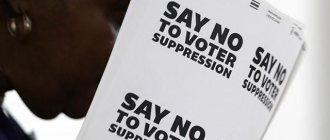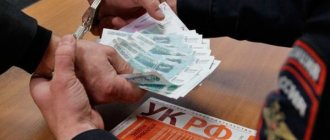Consultations and comments from lawyers
After the inclusion of the Internet in the legal norm in 2014, users of the World Wide Web need to more closely monitor their publications.
Law enforcement agencies may mistake even materials intended to be humorous or ironic as incitement to extremist activity. If in the end the court finds a social network user who posted a dubious message to the public innocent, the criminal trial will still take a lot of effort and nerves from the accused.
You should avoid overtly negative statements that involve persuading other people to view someone negatively based on group characteristics, such as race or religion.
Sometimes the situation can reach the point of absurdity. The man reposted the interview without paying attention to the picture accompanying the text. Not only the interview itself, but also an image with the inscription “Death to the Russian reptile” appeared in the public domain on a social network page. The judicial authorities have established the fact of an appeal for the physical destruction of Russians. The citizen was fined 150 thousand rubles.
Any public message will be an offense if it calls for:
- to rebellion;
- overthrow of power;
- creation of armed formations.
It is impossible to express such thoughts legally. Dissatisfaction with the authorities can be expressed in general, avoiding any challenging language. If the need to express your opinion is irresistible, it is better to turn to philologists and legal practitioners who will help exclude from the text phrases that contradict Russian law.
If for some reason an investigation has been launched against a person, it is necessary to join the investigation before initiating a criminal case. According to the investigative jurisdiction, it is carried out by investigators from the FSB. Perhaps you will be able to prove your innocence at this stage. Then litigation can be avoided.
Article 280 of the Criminal Code of the Russian Federation requires the participation of a specialist in the investigation. A linguist expert evaluates the publication for initiating a criminal case and charges in court. The accused has the right to independently apply for an examination to an independent organization. If during the court hearing a contradiction in conclusions is established, the court may order a second expert examination. If necessary, you must submit a corresponding petition during the process.
You should be attentive not only to your own actions, but also to the actions of strangers. In Chuvashia, a pensioner suffered due to extremist calls on his page on a social network
The judge did not take into account the statement that the man does not understand the Internet well, and an unlimited number of people have access to his page.
Commentary to Art. 5.10 Code of Administrative Offenses
The campaign period begins on the day the candidate is nominated and the corresponding election fund is created and ends at zero hours local time one day before voting day.
Election campaigning on the channels of television and radio broadcasting organizations and in periodicals is carried out during the period that begins 30 days before voting day and ends at zero hours local time one day before voting day, and in the case of a repeat vote - from the day of publication of the decision of the Russian Central Election Commission Federation to conduct a re-vote and ends at zero o'clock local time one day before the day of the re-vote.
Conducting election campaigning on voting day and the day preceding it is prohibited.
Printed campaign materials (leaflets, posters and others), previously posted outside voting premises, buildings and premises of election commissions in the manner prescribed by federal law at a distance of at least 50 meters from the entrance to them, are stored on voting day in their original places.
Pre-election campaigning, campaigning on referendum issues is prohibited at the location of military units, military organizations and institutions.
Local government bodies, at the proposal of the relevant commission, are obliged to allocate special places for the placement of printed campaign materials on the territory of each polling station and referendum site. Such places must be convenient for voters and referendum participants to visit and located in such a way that voters and referendum participants can familiarize themselves with the information posted there. The area of the allocated places must be sufficient to accommodate information materials of commissions and campaign materials of registered candidates, electoral associations, referendum initiative groups, and other groups of referendum participants. Registered candidates, electoral associations, referendum initiative groups and other groups of referendum participants must be allocated equal space for posting printed campaign materials. The list of these places is brought to the attention of candidates, electoral associations, the initiative group for holding a referendum and other groups of referendum participants by the commissions on whose proposals these places were allocated.
Printed propaganda materials may be posted (posted, placed) in premises, on buildings, structures and other objects only with the consent and on the terms of the owners of these objects. Placement of campaign materials at an object owned by the state or municipality or owned by an organization that has a state and (or) municipal share in its authorized (share) capital exceeding 30 percent on the day of the official publication (publication) of the decision to call (hold) elections , on the registration of the initiative group for holding a referendum, is carried out on equal terms for all candidates, electoral associations, electoral blocs, for the initiative group for holding a referendum and other groups of referendum participants. At the same time, no fee is charged for the placement of campaign materials on an object that is state or municipal property.
It is prohibited to hang (stick up, place) printed campaign materials on monuments, obelisks, buildings, structures and premises of historical, cultural or architectural value, as well as in buildings and premises of commissions, in voting premises and at a distance of less than 50 meters from the entrance in them.
The subjects of this offense are citizens, officials, and legal entities.
Features of judicial practice under Art. 280 of the Criminal Code of the Russian Federation
When considering cases, the issue of publicity of the perpetrators’ appeals must be decided taking into account the method, place, situation and other circumstances of the commission of the act.
It is necessary to understand the variety of ways and means that criminals can use. For example, public calls should be considered:
- Addressing people in a public place, at a meeting, demonstration, rally.
- Distribution of leaflets.
- Placing advertisements on the Internet (on blogs, websites, in open access diaries).
- Hanging out propaganda posters.
- Dissemination of messages via email.
In each individual case, it must be established, among other things, that the public accepted the appeals directed at it.





